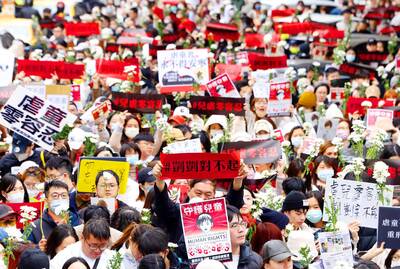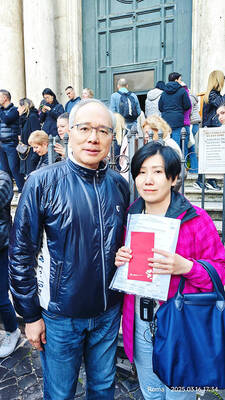The construction boss known as Mr. Pumpkinman has a lengthy criminal record — and a prominent place in the legislature.
Yen Ching-piao (顏清標), 49, who has served time for weapons and racketeering convictions, is part of a little-discussed phenomenon in domestic politics: the prevalence of criminals in elected posts.
Elementary school principal Lee Shun-liang (李順涼), who lost to Yen in the 2008 legislative elections, said one of his opponent’s major advantages was his ability to deliver tangible benefits to voters, rather than just airy ideological declarations that few care about.
A turning point came in the campaign when Yen provided dozens of computers to area schools, seemingly with no strings attached.
“Gangsters want grassroots supporters’ votes and not their money so they take good care of them,” Lee said.
‘GOD-LIKE’
Janitor Chi Tsueng-ing agreed, praising Yen for helping her daughter’s boyfriend visit a friend in jail, without asking for a customary gift in return.
“We all admire him and vote for him,” Chi said. “He’s just like a god because he answers our wishes.”
Taiwan expert Bruce Jacobs of Australia’s Monash University said gangster governance is an important part of Taiwan’s political glue, without which many people would lose a shot at fair treatment in what has long been a rigidly hierarchical society.
“They are providing services, and that creates respect within the community,” he said.
Criminals rose to prominence in politics in the late 1980s, and their influence peaked in the mid-1990s, when a third of county and municipal councilors had criminal backgrounds, former minister of justice Liao Cheng-hao (廖正豪) said.
They included former Pingtung county council speaker Cheng Tai-chi (鄭太吉), who was executed in 2000 for gunning down a gambling den competitor six years earlier.
Today, the proportion in county councils has dropped to 15 to 30 percent, estimates political scientist Chao Yung-mao (趙永茂) of National Taiwan University.
That’s still large enough to have a major impact on local politics, he said.
“Gangster deputies demand that government officials give priority to projects in their constituencies or help arrange temporary jobs in the government for their supporters,” Chao said. “They warn officials about ‘consequences’ if their wishes go unfulfilled.”
Their names are widely known in Taiwan. People like Tainan County Council Speaker Wu Chien-bao (吳健保) of the Chinese Nationalist Party (KMT), recently indicted for bribing professional baseball players. Or Nantou County power broker Chiang Chin-liang (江欽良), whose murder and extortion convictions in the 1980s raised embarrassing questions for Premier Wu Den-yih (吳敦義) after it was reported that Chiang had accompanied him on a trip to Indonesia in 2008.
Wang Yeh-lih (王業立), a National Taiwan University political scientist, said that gangster governance in local counties evolved from deals that then-president Lee Teng-hui (李登輝) cut with criminal elements in the late 1980s.
At the time, Wang said, Lee needed a strong counterweight to influential elders in his KMT party, who were trying to maintain the political dominance of the so-called “Mainlander” faction — people who had fled to Taiwan in 1949 when Mao Zedong’s (毛澤東) Communists defeated Chiang Kai-shek’s (蔣介石) Nationalists in the Chinese civil war.
Lee is an ethnic Taiwanese, and to neutralize the Mainlander faction, Wang said, Lee “nominated many ethnic Taiwanese gangsters to run in regional elections and for positions in the party’s decision-making body.”
Yen started in politics as a local precinct captain in 1990, not long after serving three years in the Green Island penal colony on racketeering charges.
CONVICT
By 1998, Yen had risen to Taichung County Council speaker and, despite being convicted of using public funds to frequent hostess bars, was elected to the legislature as an independent candidate three years later.
Yen was re-elected in 2004 — easily brushing aside another lawmaker’s charge that a cement company he owned was illegally sourcing gravel from a restricted area — and then again in 2008, not long before he began serving a nine-month sentence for providing weapons used in a failed assassination attempt on a rival gangster in 1996.
Today the burly Yen is arguably at the height of his powers. When Chinese envoy Chen Yunlin (陳雲林) visited late last year, he made it a point to pay his respects at the Jenn Lann Temple (鎮瀾宮) Yen heads in Tajia (大甲). More recently, President Ma Ying-jeou (馬英九) named Yen a special pitchman for his proposed economic cooperation framework agreement (ECFA) with Beijing — mindful that Yen’s support could influence thousands of ordinary Taiwanese still skeptical about the deal.
The center of Yen’s power base is Jenn Lann Temple, which provides him with free publicity and myriad opportunities to build support during its annual festival, an event attracting hundreds of thousands of believers. As the temple chairman, Yen has access to its hundreds of thousands of dollars in annual donations — money that can go for constituent services or good works, such as the orphanage he built not far from the temple.
Yen also has a reputation as a go-to guy for settling local disputes.
PROTECTOR
When Lin Tsung-hai, a village chief in Taichung County, saw a group of hooligans approach his community to avenge the death of one of their allies, he called Yen for help.
“Yen talked to the both sides, and the hooligans never returned,” Lin said, without elaborating.
Yen declined repeated interview requests.
Asked how his boss can dispense costly favors on a lawmaker’s modest salary, office director Hsu Kuo-sheng (陸窸? acknowledged that Yen’s cement and construction companies play a role.
“Sometimes the lawmaker has to pay out money at more than 10 functions a day, including weddings and funerals,” Hsu said. “His legislative salary can barely cover his constituency service expenses, so he has to tap into his business revenues.”
Yen’s companies have won at least two government contracts in recent years, public records show.
Hsu said while Yen now devotes much of his energy to leading local charity efforts as the temple chairman, the lawmaker still feels burdened by his colorful past.
“Sometimes he complains to me that no matter how hard he tries to do good works, people still criticize him,” Hsu said.

Taiwan yesterday condemned the recent increase in Chinese coast guard-escorted fishing vessels operating illegally in waters around the Pratas Islands (Dongsha Islands, 東沙群島) in the South China Sea. Unusually large groupings of Chinese fishing vessels began to appear around the islands on Feb. 15, when at least six motherships and 29 smaller boats were sighted, the Coast Guard Administration (CGA) said in a news release. While CGA vessels were dispatched to expel the Chinese boats, Chinese coast guard ships trespassed into Taiwan’s restricted waters and unsuccessfully attempted to interfere, the CGA said. Due to the provocation, the CGA initiated an operation to increase

A crowd of over 200 people gathered outside the Taipei District Court as two sisters indicted for abusing a 1-year-old boy to death attended a preliminary hearing in the case yesterday afternoon. The crowd held up signs and chanted slogans calling for aggravated penalties in child abuse cases and asking for no bail and “capital punishment.” They also held white flowers in memory of the boy, nicknamed Kai Kai (剴剴), who was allegedly tortured to death by the sisters in December 2023. The boy died four months after being placed in full-time foster care with the

A Taiwanese woman on Sunday was injured by a small piece of masonry that fell from the dome of St Peter’s Basilica in the Vatican during a visit to the church. The tourist, identified as Hsu Yun-chen (許芸禎), was struck on the forehead while she and her tour group were near Michelangelo’s sculpture Pieta. Hsu was rushed to a hospital, the group’s guide to the church, Fu Jing, said yesterday. Hsu was found not to have serious injuries and was able to continue her tour as scheduled, Fu added. Mathew Lee (李世明), Taiwan’s recently retired ambassador to the Holy See, said he met

The Shanlan Express (山嵐號), or “Mountain Mist Express,” is scheduled to launch on April 19 as part of the centennial celebration of the inauguration of the Taitung Line. The tourism express train was renovated from the Taiwan Railway Corp’s EMU500 commuter trains. It has four carriages and a seating capacity of 60 passengers. Lion Travel is arranging railway tours for the express service. Several news outlets were invited to experience the pilot tour on the new express train service, which is to operate between Hualien Railway Station and Chihshang (池上) Railway Station in Taitung County. It would also be the first tourism service